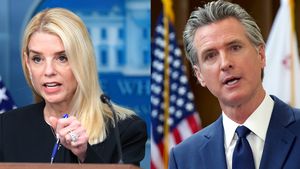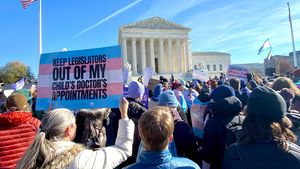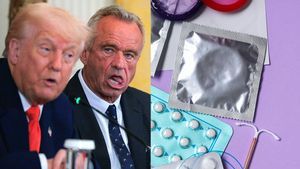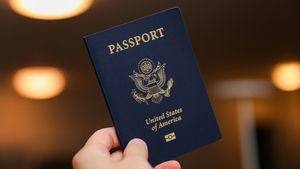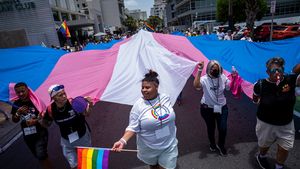In a less enlightened age of Hollywood -- if we can even imagine such a thing -- Michelle Pfeiffer was often referred to by her looks. It's ironic, because she always seemed to loathe the topic. At one point, before her acting career had taken off, Pfeiffer's hairdresser came to her house, trying to convince her to sign up for a beauty pageant. Her immediate instinct was to throw him out, but he revealed the all-too-important caveat in the nick of time: One of the judges was a commercial agent, and a potential pathway to a real acting gig.
Far after she'd landed as an actor, a 1988 profile in Interview referred to Pfeiffer as a "Blond Venus" who was the "next screen dream," listing off accolades such as Time calling her "drop-dead gorgeous" and Harper's Bazaar naming her "one of the ten most beautiful women in the world." At that time, she already earned critical acclaim for her acting chops in the now-iconic film Scarface, and bested the box office with The Witches of Eastwick. Just a few years later, she'd go on to secure three Oscar nominations and, by all measure, become one of the most dazzling stars Tinseltown had to offer.
And yet, her beauty still seemed to dominate so much of the conversation. Until, of course, she all but left that conversation -- effectively "disappearing" from Hollywood (or, at the very least, the media circus that accompanied it). It's telling that one of Pfeiffer's most popular quotes is, "Just standing around looking beautiful is so boring." And, perhaps more revealing are the roles she's chosen of late, which have evolved along with the industry.
"I've actually passed on a number of projects that were very hard to turn down," she told The New York Times around the release of her starring role in the Darren Aronofsky film Mother!. "I certainly don't want to be putting out any more toxicity."
Now, she's approaching beauty with this same sense of responsibility. Today marks the launch of Henry Rose, a line of five fine fragrances founded by the actress. The very idea for the company was born out of her initial retreat from the spotlight.

"When I became a new mother, I started to look at the world through the eyes of my kids," Pfeiffer tells Out. "I started to pay closer attention to the products that I was exposing them to, and around that same time, my father was diagnosed with cancer, my best friend was diagnosed with cancer, and so it was just the perfect storm."
Pfeiffer's self-proclaimed "wake-up call" led her to a database of cosmetic products called Skin Deep, which is an initiative led by the Environmental Working Group. According to their website, the EWG "uses the power of information to protect human health and the environment" by having "staff scientists compare the ingredients on personal care product labels and websites to information in nearly 60 toxicity and regulatory databases." Today, you can look up virtually any product you're about to purchase, and search it on Skin Deep's database before receiving immediate information about any potential harmful ingredients located inside.
"I went down the rabbit hole with this database," Pfeiffer recalls. "But whenever 'fragrance' would pop up, over and over again, EWG would flag it as a high hazard."
The reasons for this are potentially two-fold: Whenever you see "fragrance" as a listed ingredient in a cosmetic product, Pfeiffer explains, that's really a catch-all for multiple other ingredients that do not need to legally be disclosed by the cosmetics companies. "There's absolutely no regulation around it as an ingredient," she says. Conventional beauty industry knowledge would say that's because major brands want to protect their signature scents from being copied by their competitors. Pfeiffer, for her part, calls bullshit.
"Fragrance has been really shrouded in secrecy, and people need to know there are some of us in the world who have severe and chronic allergy sensitivities, and this affects their day-to-day life," she says.
Dismayed by the database results, Pfeiffer chucked her fragrances altogether. All the while, her peers racked up multimillion dollar cosmetics contracts and licensed fragrance deals. "That would have been the easy way to go," she says. "I was told, 'No, you should do a makeup line. You should do a personal care line. You should do skincare. You're doing this backwards, you're going to fail.'"
So, just like it was another one of her projects, Pfeiffer threw herself head-first into her latest: launching her own fragrance company. The only problem? Finding licensed perfumers who could actually make a product that wouldn't get flagged by the Environmental Working Group.
In the way that perhaps only a woman with Pfeiffer's clout can, she used her influence to bring multiple parties to the table: First, the EWG, who had become her trusted resource; second, Cradle to Cradle, a non-profit that provides certification on product safety; and third, IFF, otherwise known as International Fragrances and Flavors, one of the most renowned perfume companies in the world. Together, they all deliberated on how to bring Pfeiffer's mission to life.
"I tied their hands behind their backs," she says. "We went from a palate where the perfumers [Yves Cassar and Pascal Gaurin] typically pick from over 3,000 ingredients, and by the time we whittled them down, we were left with roughly 300." And over the past near-decade of work to make this happen, she was nervous that, at any step of the way, they would throw their hands up in exasperation.

Of course, that didn't happen. Five distinct scents makeup the range -- which still contains hallmarks of perfumery, like white neroli, patchouli, vetiver, and other woods. At the moment, Pfeiffer's go-to in the rotation is "Torn," an update on the classic "oriental" category, which is usually denoted by spices and vanillas. "It's always been my favorite," she says. "It's one of the first I formulated."
The other she loves is simply called "Light," which she notes is "the hardest to describe." With hints of wood and an airy, ethereal top note, she recommends it on days you crave something simpler, or layering it with another scent you love.
The cherry on top of Pfeiffer's thoroughly modern fragrance collection? The fact that all of it is marketed without gender. "That was something I decided early on," she declares. "It just made sense to me. But I was discouraged by everyone at the time: Genderless fragrances don't sell, that's what I was told. But I really wanted Henry Rose to be for everyone."
"Fragrance is such a personal experience," she continues. "It just shouldn't be tied to the idea that it's for any specific gender. We're past that."
Pfeiffer, effectively, has done her part in taking the path of most resistance before adding one more line to her resume: businesswoman. Against all advice of conventional beauty wisdom, today she celebrates the launch of a company years in the making. But, as we all know, that's not the only thing she has in store for us in 2019.
Even though she's listed on the IMDB credits for this weekend's Avengers: Endgame, she tells me she "cannot talk about it all." (So we'll be seeing for ourselves in theatres.) Later on, we'll see her alongside Angelina Jolie as Queen Ingrith in Maleficent 2, and another project in the works called French Exit.
"Every year, one of my New Year's resolutions is to simplify, just tear down, just simplify. And I'm so failing at that right now," she says. "I have so many things going on." Somehow in the simplification process, Pfeiffer found herself between takes of Maleficent 2, approving bottle designs and selecting a brand name.
At least now her fans have a Disney queen and a universal line of fragrances to toast the actress with. But still, there's one thing she asks of Out readers as a potential gift to her come Halloween time -- something of an homage to what could easily be one of her most iconic roles.
"I want a group photo of all the Catwomans in the gay bar," she says. "I will post it on my Instagram."






























